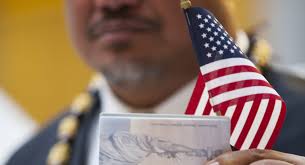Trump’s order on birthright citizenship violates the Constitution.
By The Editorial Board ~Wall Street Journal~ Oct. 30, 2018
President Trump really, really wants to make the midterm election about immigration, and for a while it looked like he had an edge due to Democratic excess. But with this week’s pre-election vow to end birthright citizenship in America by executive order, Mr. Trump has driven into his own constitutional ditch.
Mr. Trump has the political high ground as long as he is trying to stop lawlessness or deter migrant caravans mobilized by left-wing groups in Central America. Even deploying soldiers to the border in nonmilitary roles can be justified to assist immigration agents overwhelmed by asylum seekers. The U.S. has to send a signal that no one can bum-rush the border—not least to deter migrants from making a trip that will end in disappointment, or worse.
By contrast, the birth citizenship gambit puts Mr. Trump on the wrong side of immigration law and politics. Did Michael Cohen give him this legal advice?
The right to citizenship for anyone born on U.S. soil is derived from the Fourteenth Amendment adopted in 1868: “All persons born or naturalized in the United States and subject to the jurisdiction thereof, are citizens of the United States and of the State wherein they reside.” This is the common law doctrine of jus soli, or right of the soil.
Opponents of birth citizenship try to obscure this plain meaning by interpreting “subject to the jurisdiction” as applying only to those who owe allegiance to America. Because alien parents owe allegiance to a different sovereign, the argument goes, their children have no right to citizenship.
But “jurisdiction” is well understood as referring to the territory where the force of law applies, and that means it applies to nearly everyone on U.S. soil. The exceptions in 1868 were diplomats (who have sovereign immunity) and Native Americans on tribal lands. Congress later granted Native Americans birth citizenship while diminishing tribal sovereignty.
The jurisdiction of U.S. law surely applies to all immigrants, or they could not be prosecuted for breaking even immigration laws. As for owing allegiance, do we really want to set a precedent that has the government defining which American residents owe allegiance to the U.S. and which don’t? What would that mean for American citizens who are also citizens of another country?
The very purpose of the Fourteenth Amendment was to prevent politicians from denying citizenship to those they thought weren’t American enough. This meant former slaves, but in the debate over the amendment the question of citizenship for immigrant children was raised directly. As David Rivkin and John Yoo have recounted, Pennsylvania Sen. Edgar Cowan asked: “Is the child of the Chinese immigrant in California a citizen?” Sen. John Conness of California responded yes.
The Supreme Court reinforced that meaning in U.S. v. Wong Kim Ark(1898) by upholding the citizenship of a child born in San Francisco of Chinese parents barred from citizenship by the Chinese Exclusion Act. The Court wrote that “the 14th Amendment affirms the ancient and fundamental rule of citizenship by birth within the territory, in the allegiance and protection of the country, including all children here born of resident aliens.”
Mr. Trump may imagine the current Supreme Court would rule differently. We doubt it. Justices who consider themselves loyal to the Constitution’s plain text would have a hard time reading the word “allegiance,” with all its ambiguity, into the Fourteenth Amendment. Meanwhile, lower courts are likely to rule against his executive order faster than they did Barack Obama’s lawless orders granting work permits to millions of illegal aliens.
If Mr. Trump wants to end the practice sometimes called “birth tourism,” he can always draft and campaign for a constitutional amendment. But Congress is unlikely to agree and pass a law, much less an amendment. So he is making this futile gesture of an executive order a week before Election Day.
Mr. Trump made a political mistake this year by not trading legal status to adult immigrants brought here illegally as children for more border security. Then Republicans could have run on an immigration accomplishment. Instead he wanted the political issue, and we’ll soon see how well that worked.
The President still stands on firm legal and political ground when he fights sanctuary cities or the abolition of U.S. Immigration and Customs Enforcement. But he undermines his legal standing, and his political credibility, when he pulls a stunt like single-handedly trying to rewrite the Fourteenth Amendment.
Source: The Editorial Board ~Wall Street Journal~ Oct. 30, 2018







